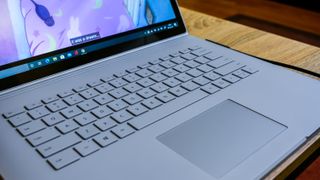Surface Book 4: what we want to see
Will we see a Surface Book 4 at the September 22 event?

The Surface Book 3 landed in May 2020, so it's time for Microsoft to finally launch the Surface Book 4. And we're not predicting an imminent release out of nothing either: Microsoft has a big Surface event coming up on September 22.
The Surface Book lineup usually sees a couple years in between releases (unlike the Surface Laptop 4, for example) so it's entirely possible we won't see the new ultra-premium laptop until 2022. And Microsoft may be preparing an ultra-premium device instead, something that could be called the Surface Laptop Studio.
Either way, we won't know if the Surface Book 4 is real until Microsoft itself lifts the veil. In the meantime, we'll gather up all the latest news, rumors and leaks right here so you can be ready when Microsoft finally pulls the trigger.
Cut to the chase
- What is it? The next generation Surface Book
- When is it out? Hopefully Q2 2022
- What will it cost? Probably just as much, if not more, than the Surface Book 3
Surface Book 4 release date
If you’ve followed the Surface Book since the line initially launched in 2015, you probably already know that Microsoft rolls these 2-in-1 laptops out every two years or so. The original Surface Book debuted in late October 2015 while its successor, Surface Book 2, came out in November 2017.
2019 came and went without a Surface Book 3; Microsoft opted to release three other Surface devices instead (Surface Pro 7, Surface Pro X and Surface Laptop 3). The device finally saw the light of day in May 2020.
So it would follow that Microsoft would wait until 2022 to launch the Surface Book 4, and that's still totally possible. However, with Microsoft teasing premium Surface devices at its September 22 event, we could see the Redmond tech giant launch it a bit earlier than usual – hopefully this time with updated specs. We're crossing our fingers that we'll see the device at the event later this week.

Surface Book 4 price
The Surface Book line has been flip flopping in terms of price tag. The original 13-inch device cost a hefty $1,499 (about £1,190, AU$2,140) when it first came out, but the 13-inch Surface Book 2 was even cheaper at $1,199 (£1,149, AU$2,199). Then, the Surface Book 3 13-inch kicked off at a hefty $1,599 (£1,599, AU$2,649).
Get daily insight, inspiration and deals in your inbox
Sign up for breaking news, reviews, opinion, top tech deals, and more.
Bizarrely enough, while the Surface Book 2 15-inch cost $2,499 (£2,349, AU$3,649), the Surface Book 3 15-inch dropped down to $2,299 (£2,199, AU$3,699).
So, how much the Surface Book 4 13-inch and 15-inch models are going to cost is anyone’s guess at this point. If it does come out with a more generational and competitive upgrade, then a higher price tag would somehow be easier to swallow.
Still, we’re hoping for a bit of a price drop here. After all, $1,599 (£1,599, AU$2,649) for Surface Book 3’s Intel Core i5, Intel Iris Plus, 8GB RAM and 256GB SSD is pretty steep for most people.

What we want to see in a Surface Book 4
Although the Surface Book 3 has a lot going for it – namely, beautiful design, a stunning display and a comfortable keyboard, it was pretty underwhelming considering that Microsoft had a little over two years to hone in and work on necessary improvements.
So, for the Surface Book 4, we’re hoping to see even more upgrades inside and out, starting with a more powerful processor.
More powerful processors
Sadly, the Surface Book 3 was held back by the lack of H-series processors, which is even more disappointing considering that high price tag and the fact that Microsoft touts this as a gaming-ready device. Especially if Microsoft insists on that premium price tag, we’d like to see Surface Book 4 actually feature Intel’s higher-end 12th-generation chips (11th-generation Tiger Lake, if this follow up does come out sometime in 2021).
Either this or drop the price down to something more accessible.
Bigger trackpad
The current trackpad on the Surface Book 3 is smooth, responsive and gets the job done. However, it’s also tiny – like late 2000ss tiny. Again, if you’re paying a premium price for a laptop, you’d want things like a trackpad with massive surface space to work with. If the Surface Book 4 were to stay competitive with the likes of the MacBook Pro 13-inch, this is practically non-negotiable.
Better speakers
For a thin, light and tiny laptop, the MacBook Pro 13-inch sure has plenty of audio power, and the sound quality isn’t bad either. Sadly, the speakers on the Surface Book 3 are only adequate. Worse, it’s lacking bass and low-end, so watching blockbusters or playing games on its otherwise gorgeous display isn’t as immersive as it should have been. If the Surface Book 4 were to stay on top of the game, it needs to have better sounding and more powerful speakers.



A floating screen, like the new iPad Pro
Ryan Smalley of Modality recently shared his design concept for the next Surface Book, and frankly, we’re here for it. Inspired by the new iPad Pro, his concept gives the Surface Book 4 a similar floating screen that’s anchored to a chassis with two hinges – one for the familiar laptop form factor, the other to give it that floating effect. Both hinges in this design are height and angle adjustable for even more viewing and use versatility.
Unlike the iPad Pro, however, there’s no removable keyboard and trackpad case here. The Surface Book 4 screen is permanently attached to the rest of the laptop, so that it’s basically a traditional laptop, only with a bit more flexibility.

Michelle Rae Uy is the former Computing Reviews and Buying Guides Editor at TechRadar. She's a Los Angeles-based tech, travel and lifestyle writer covering a wide range of topics, from computing to the latest in green commutes to the best hiking trails. She's an ambivert who enjoys communing with nature and traveling for months at a time just as much as watching movies and playing sim games at home. That also means that she has a lot more avenues to explore in terms of understanding how tech can improve the different aspects of our lives.
Most Popular


